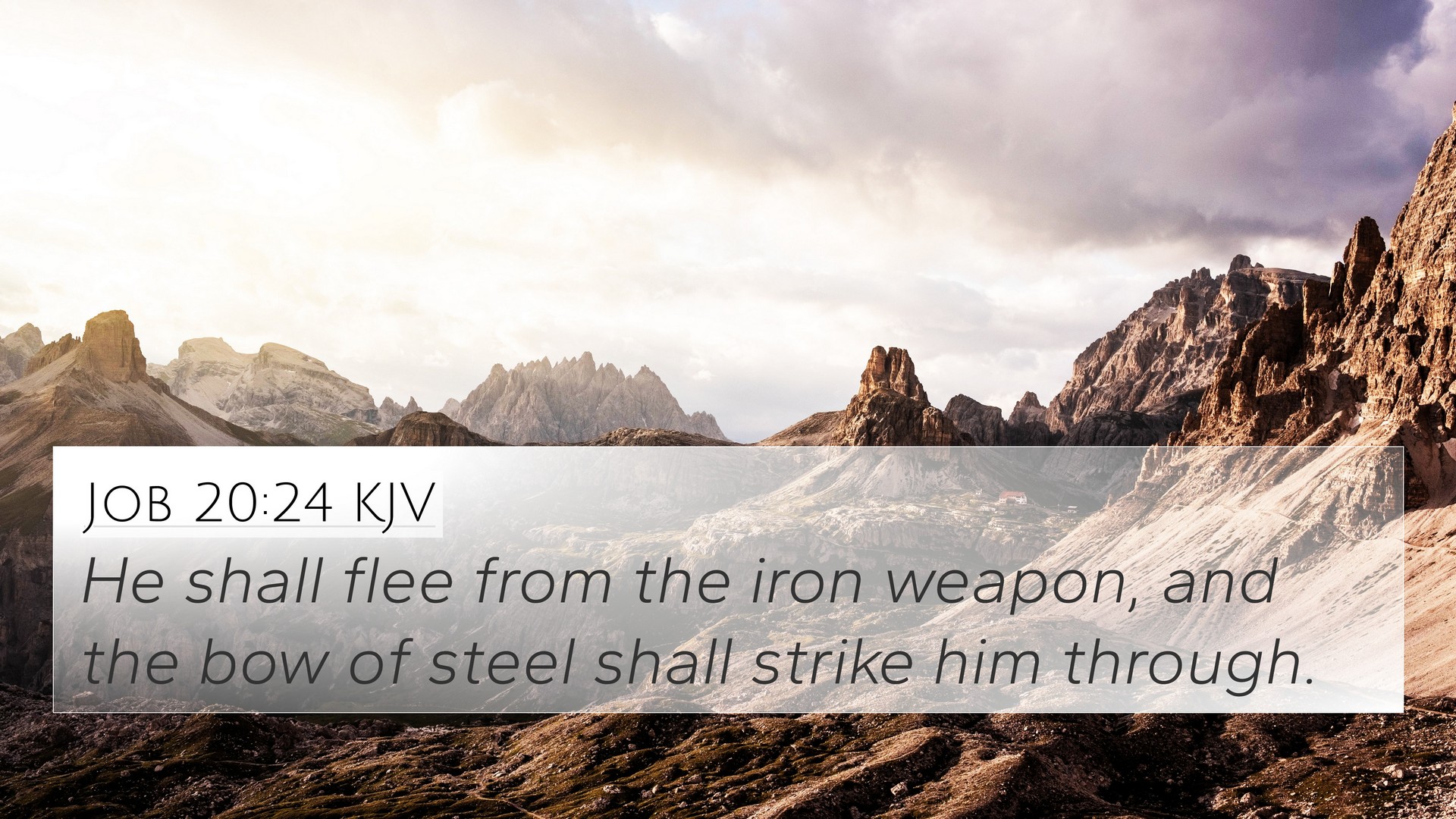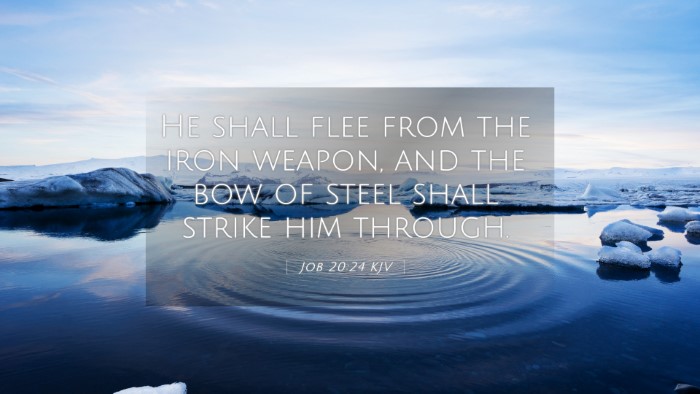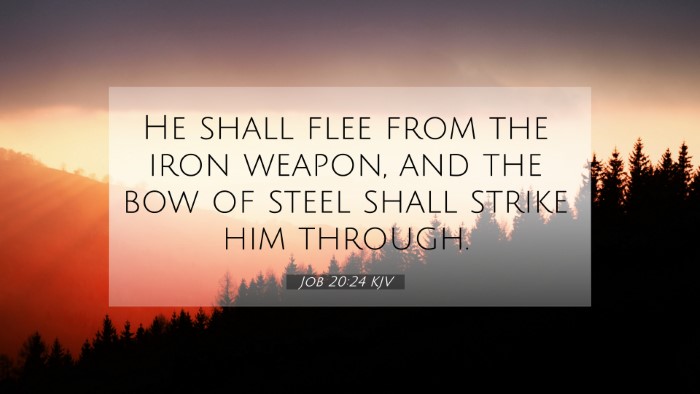Old Testament
Genesis Exodus Leviticus Numbers Deuteronomy Joshua Judges Ruth 1 Samuel 2 Samuel 1 Kings 2 Kings 1 Chronicles 2 Chronicles Ezra Nehemiah Esther Job Psalms Proverbs Ecclesiastes Song of Solomon Isaiah Jeremiah Lamentations Ezekiel Daniel Hosea Joel Amos Obadiah Jonah Micah Nahum Habakkuk Zephaniah Haggai Zechariah MalachiJob 20:24 Similar Verses
Job 20:24 Cross References
He shall flee from the iron weapon, and the bow of steel shall strike him through.
Uncover the Rich Themes and Topics of This Bible Verse
Listed below are the Bible themes associated with Job 20:24. We invite you to explore each theme to gain deeper insights into the Scriptures.
Job 20:24 Cross Reference Verses
This section features a detailed cross-reference designed to enrich your understanding of the Scriptures. Below, you will find carefully selected verses that echo the themes and teachings related to Job 20:24 KJV. Click on any image to explore detailed analyses of related Bible verses and uncover deeper theological insights.
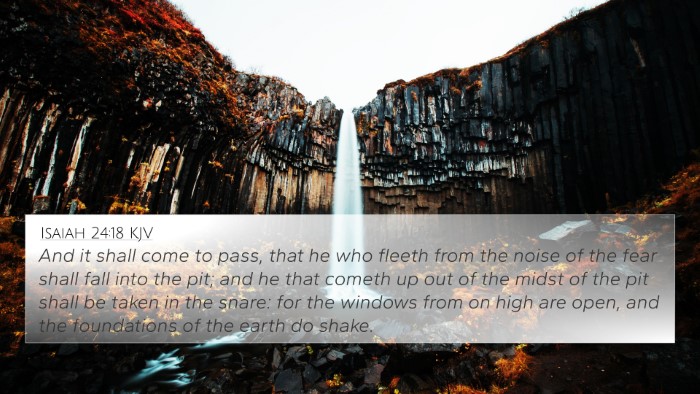
Isaiah 24:18 (KJV) »
And it shall come to pass, that he who fleeth from the noise of the fear shall fall into the pit; and he that cometh up out of the midst of the pit shall be taken in the snare: for the windows from on high are open, and the foundations of the earth do shake.

Amos 5:19 (KJV) »
As if a man did flee from a lion, and a bear met him; or went into the house, and leaned his hand on the wall, and a serpent bit him.

1 Kings 20:30 (KJV) »
But the rest fled to Aphek, into the city; and there a wall fell upon twenty and seven thousand of the men that were left. And Benhadad fled, and came into the city, into an inner chamber.

Proverbs 7:23 (KJV) »
Till a dart strike through his liver; as a bird hasteth to the snare, and knoweth not that it is for his life.
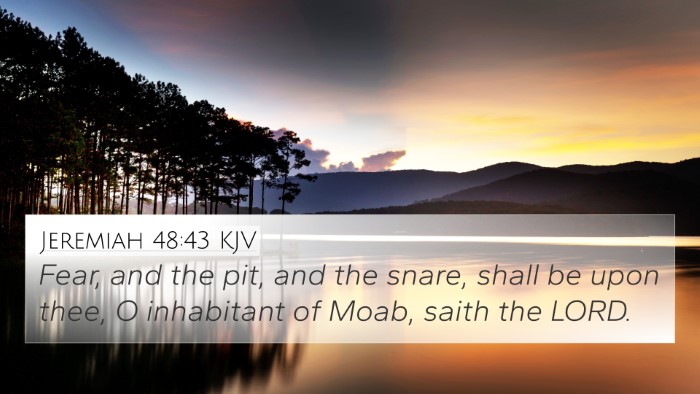
Jeremiah 48:43 (KJV) »
Fear, and the pit, and the snare, shall be upon thee, O inhabitant of Moab, saith the LORD.
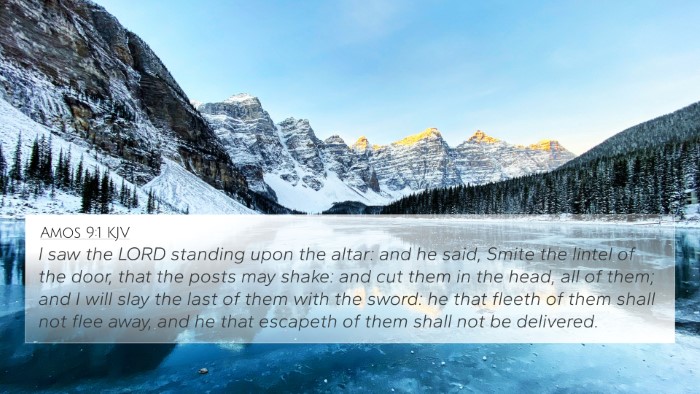
Amos 9:1 (KJV) »
I saw the LORD standing upon the altar: and he said, Smite the lintel of the door, that the posts may shake: and cut them in the head, all of them; and I will slay the last of them with the sword: he that fleeth of them shall not flee away, and he that escapeth of them shall not be delivered.
Job 20:24 Verse Analysis and Similar Verses
Understanding Job 20:24
Job 20:24 states, "He shall flee from the iron weapon, and the bow of steel shall strike him through." This verse is part of one of Zophar's speeches, where he outlines the fate of the wicked, emphasizing the inescapable judgment they will face due to their sinful actions.
Summary of Commentaries
Drawing on insights from renowned biblical commentators such as Matthew Henry, Albert Barnes, and Adam Clarke, we can derive a more profound understanding of this verse.
-
Matthew Henry:
Henry explains that this verse illustrates the inevitability of punishment for the ungodly, referencing how they may dodge some earthly dangers but ultimately cannot escape divine retribution.
-
Albert Barnes:
Barnes emphasizes that the 'iron weapon' symbolizes God’s instruments of judgment that the wicked cannot evade. The 'bow of steel' further implies the formidable nature of God's justice.
-
Adam Clarke:
Clarke notes that the passage serves as a reminder of the ultimate accountability everyone has before God, and that earthly struggles will culminate in an eternal consequence for those who persist in wickedness.
Thematic Connections
Job 20:24 ties into broader themes found throughout the Scripture concerning judgment and accountability, reinforcing the notion that the wicked cannot hide from God's punitive actions. Below are some cross-references that align with this verse's message of divine justice:
- Psalm 7:12-13: - Discusses how if one does not turn from evil, God will prepare instruments of judgment.
- Proverbs 11:21: - States that the wicked will not go unpunished, affirming the certainty of divine justice.
- Isaiah 57:20: - Illustrates how the wicked are like the troubled sea, unable to find rest, alluding to their eventual downfall.
- Romans 2:6: - Highlights that God will repay each person according to their deeds, paralleling Job's call for justice.
- Revelation 21:8: - Lists the fates of the unrepentant, reinforcing the theme of judgement against the wicked.
- Job 31:3: - Job himself declares that God’s punishment is for the wicked, touching on accountability.
- 2 Thessalonians 1:7-9: - Speaks about God’s retribution against those who do not obey the gospel, reminiscent of Job's themes of justice.
Bible Cross-Reference Tools
In studying Job 20:24 and its implications, it is beneficial to utilize cross-reference tools that allow for deeper exploration of themes, connections, and interpretations. Below are suggestions for efficient Bible cross-referencing:
- Bible Concordance: A comprehensive index of biblical terms that can help find cross-references quickly.
- Bible Cross-Reference Guide: Resources that categorize verses by themes, aiding in thematic studies.
- Cross-reference Bible Study: Methods that encourage diving into related verses for a holistic understanding.
- Comprehensive Bible Cross-Reference Materials: Books or digital resources that provide extensive cross-references for deeper study.
Practical Application
For those looking to discover how Job 20:24 relates to other scriptures, it is essential to identify links not just within the immediate context but also across the entirety of Scripture. Engaging in comparative Bible verse analysis can lead to a richer understanding of biblical themes.
By cross-referencing this verse with others, believers can understand the broader narrative of scripture regarding divine justice and human conduct. This practice of linking Bible scriptures can strengthen one’s faith and comprehension of God’s character and the workings of divine justice.
Conclusion
In summary, Job 20:24 serves as a powerful reminder of the consequences faced by the wicked. Utilizing public domain commentaries allows for a well-rounded interpretation of this scripture. Furthermore, employing effective tools for Bible cross-referencing will enhance the understanding of its interconnections and the profound realities of divine judgment.
